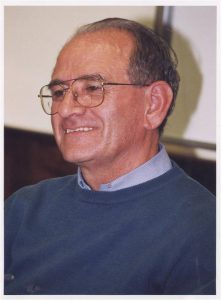 I address this message to you in the form of a letter addressed to St. Camillus. At the end of the commemorative year of the two hundred and fiftieth anniversary of his canonisation, my employment of this literary genre enables me to speak with greater spontaneity about our Founder. My text seeks to be a response to the testamentary letter that he bequeathed to us.
I address this message to you in the form of a letter addressed to St. Camillus. At the end of the commemorative year of the two hundred and fiftieth anniversary of his canonisation, my employment of this literary genre enables me to speak with greater spontaneity about our Founder. My text seeks to be a response to the testamentary letter that he bequeathed to us.
‘Dear St. Camillus, this year, as well, on the occasion of your feast day I have re-read your testamentary letter that was addressed to your sons on 10 July 1614, a few days before you died. The fact that you asked it to be conserved in ‘perpetual memory’ indicates the importance that you attributed to it. This is a testament in which some important recommendations are gathered together for our religious who are called to maintain alive over time the charism of merciful charity towards the sick.
When speaking about the foundation of the Order of the Ministers of the Sick, which was your work, you did not hesitate to attribute it to a miraculous intervention of the Lord. This statement is accompanied by sentiments of humility which were habitual in you: ‘I have said that this foundation is an evident miracle of God: in particular that He should have used me, a great sinner, ignorant, full of so many defects and failings, worthy of a thousand hells. But God is the master, He can do as He wishes and it is done infinitely well. No one should be amazed that God worked through such an instrument, given that it is to His greater glory to do admirable things using a nobody such as myself’.
Attributing to the Lord the foundation of the Order made you forceful in requiring that it should be faithful to the task for which it was instituted – service to the sick. Concern about the future of your work made you use severe words which were not without a certain alarmism. When speaking about all the internal and external opposition provoked by the devil to destroy what God inspired you to achieve, you were aware that this opposition would also continue in the future. When you stated that the spirit of evil would search for ‘all roads and means possible’ to destroy the Order, you emphasised that ‘if he does not manage under the appearance of evil he will try under the appearance of good’. And you went on: ‘in particular he could use some religious of this very Order of ours, suggesting to them under the appearance of good that they should deviate and alter the purpose of our Institute’. You then ended with a certain severity: ‘Each religious should be careful about such a great sacrilege and offence to God lest it fall on them in this life even more than in the other’.
Almost four centuries after the day you wrote these words, you can observe that the Order that you founded has, in substantial terms, remained faithful to the charism that you handed down. During these long years there have been crises, conflicts, and momentary deviations. Adversities of all kinds – from the political to the religious – have rained down on the little plant of the Institute, taking it to the edge of extinction. However without destroying it. Did not perhaps the crucified Christ assure you that the foundation of the Company of the poor servants of the sick was his work and not yours?
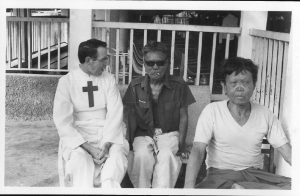 There can be no hesitation in affirming that it was specifically faithfulness to service to the sick that helped the religious to recover courageously after every storm. This was heroic faithfulness, as is demonstrated by the over three hundred religious who died serving the plague-stricken and the victims of other infectious diseases. This was creative faithfulness, through a slow but constant work of updating which, in recent years, has led to the discovery of new wells, thereby expanding the fan of expression of the ministry of the Order which is by now present – as you prophesied – in all the continents of the world. In the new Constitution of the Order we can perceive the breath of the Spirit which has traversed the Church. Just as it fell to you to implement the dictates of the Council of Trent, so it is our task to make the doctrine of the Second Vatican Council – and the Synod of Consecrated Life which took up its essential points – the inspiration and the nourishment of our existential and charitable choices. To observe that by the grace of God the Order that you founded is moving forward with hope at the beginning of the third millennium certainly does not place us in that state of foolish security which is typical of those who think that they have no need of conversion. How can we not be aware of the limitations and the slowness that characterise our way of being and acting? Fortunately, life and events constantly offer us points for reflection that trouble in a healthy way the ‘peace of our religious houses’. Some of them are already to be found in your letter. I want to remind you of them in order to make you know that they echo amongst us after four centuries.
There can be no hesitation in affirming that it was specifically faithfulness to service to the sick that helped the religious to recover courageously after every storm. This was heroic faithfulness, as is demonstrated by the over three hundred religious who died serving the plague-stricken and the victims of other infectious diseases. This was creative faithfulness, through a slow but constant work of updating which, in recent years, has led to the discovery of new wells, thereby expanding the fan of expression of the ministry of the Order which is by now present – as you prophesied – in all the continents of the world. In the new Constitution of the Order we can perceive the breath of the Spirit which has traversed the Church. Just as it fell to you to implement the dictates of the Council of Trent, so it is our task to make the doctrine of the Second Vatican Council – and the Synod of Consecrated Life which took up its essential points – the inspiration and the nourishment of our existential and charitable choices. To observe that by the grace of God the Order that you founded is moving forward with hope at the beginning of the third millennium certainly does not place us in that state of foolish security which is typical of those who think that they have no need of conversion. How can we not be aware of the limitations and the slowness that characterise our way of being and acting? Fortunately, life and events constantly offer us points for reflection that trouble in a healthy way the ‘peace of our religious houses’. Some of them are already to be found in your letter. I want to remind you of them in order to make you know that they echo amongst us after four centuries.
- The first relates to preferential love for the poor. This is an expression which is certainly not new for your ears and above all for your heart. In 1989, a General Chapter was held on this subject. This subject, fully illustrated by the assembly of the General Chapter, was then discussed in every community of the Order. There have also been positive outcomes: not only an increased sensitivity to this topic but also concrete initiatives for the last – those with AIDS, drug addicts, people of the Third World, the chronically sick…May heaven be thanked for this breeze of charitable fervour which has certainly been mediated by your intercession! This performs the function of reminding all religious who are legitimately and generously involved in other works and activities that the poor must take pride of place in the heart of a Camillian. Did not your heart of a mother perhaps beat in a completely special way for those who were at the margins of society, in hospitals, in refuges, and in the streets? When observing the poor who ‘bivouacked’ outside the Church of St. Mary Magdalene, I cannot hold myself back from thinking what you would have done to help these people who have been made ugly and violent by misery. I cannot deny that I feel a sense of shame…
The pluralism that characterises the practice of the ministry of our Order is certainly an excellent formula which allows us to be present in all sectors of the world of health and health care. However, it will be perfect only when the initiatives for the poor have at least the same importance in our hospitals, nursing homes, centres for formation…
The title of the General Chapter of 1989 was ‘Towards the Poor of the Third World’. There can be no doubt that the Order has taken steps to go beyond nationalism and various forms of regionalism. Over the last fifty years, the expansion of the Institute has been great, bringing our red cross to twenty new countries, the majority of which are developing countries. This comforting missionary dimension can only make itself more visible in the priorities of our programmes and in the choices of our works. Are there not perhaps too many people who feed on the crumbs that fall from our tables?
You taught us that love for the poor and the sick must be accompanied by an attentive and joyous implementation of the vow of poverty. The words that you wrote on this subject in your testamentary letter deserve to be remembered: ‘In recommending faithfulness to our holy vocation I make special mention of the vow of poverty. On this point, I do not want to neglect to say and to remind all present and future religious that if, as is right, we wish our service to the sick poor in hospitals – our principal task – and in the commending of souls, to continue and last for ever, we must maintain the purity of our poverty, with all exactitude, diligence and good spirit, in a way established by the Bulls, because it will continue to exist the more poverty is observed to perfection, that is to say even in the smallest things’.
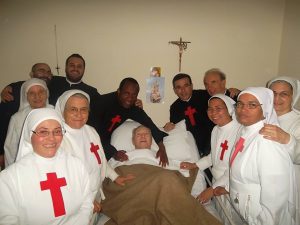 How can we be indifferent to such an appeal? It shakes our lifestyle which is far too often distant from the ideals professed through the vow of poverty. How much resort to discussions of a sociological and theological character to justify choices which in themselves are not justifiable; how many rationalisations! There can be no doubt – and this is the meaning of your words – that material satiety gradually ends up by attenuating the need for God and the sense of solidarity and the sharing of possessions and one’s own person which are the essential ingredients both of community life and the exercise of our ministry.
How can we be indifferent to such an appeal? It shakes our lifestyle which is far too often distant from the ideals professed through the vow of poverty. How much resort to discussions of a sociological and theological character to justify choices which in themselves are not justifiable; how many rationalisations! There can be no doubt – and this is the meaning of your words – that material satiety gradually ends up by attenuating the need for God and the sense of solidarity and the sharing of possessions and one’s own person which are the essential ingredients both of community life and the exercise of our ministry.
In an opulent and consumerist society, we feel that keeping ourselves agile, carrying in our luggage only the essential, is a task that only the grace of God can grant to us. For this reason, we entrust ourselves to your intercession.
- A second point for thought is the relationship between fathers and brothers. You invited us in a sad way to union and peace, reminding us that one of the factors that marks out our Institute from others is the ‘common goal of fathers and brothers’. Going back to the subject you expressed a strong appeal: ‘nobody should strive, albeit for any appearance of good, to take from the brothers what the Apostolic See has granted to them’.
Down the centuries, your exhortation was for too long ignored because of a violent and unjust clericalism which reigned throughout the Church. Great injustices have been committed towards confreres and not all the wounds have healed. Despite these difficulties the Order can boast a wonderful gallery of religious who were brothers.
The situation has improved, as is evident in the new Constitution of the Order where one can see the result of a long journey directed towards proclaiming the equal dignity of fathers and brothers, who are, indeed, involved in the same mission. The Order has gone ahead further than the Church in affirming the rights of brothers, as a result of which at the present moment the dictates of the Code of Canon Law – which is still markedly clerical in character – impede us from completely putting into practice what our Constitution lays down.
Unfortunately, joy at this positive pathway in the field of law and mentality is darkened by the crisis that the figure of the brother is experiencing at the level of the whole of the Church, even in countries where vocations to consecrated life are numerous. May your great love for the brothers help us to find the right path for a rebirth!
- A short sentence from your testamentary letter invites us to reflect on a third subject: ‘I exhort all present and future religious not to seek to know more than what is needed’. It is not easy to understand what you were referring to with these words. In my interpretation (which is perhaps a little adjusted), I connect it to the ‘question of studies’. Amongst the multiple ‘conversions’ of your life, one concerned specifically the level of learning of your religious. At a certain point, you realised the importance of studies for religious involved in providing care to sick people. During the history of the Order there has been no lack of personalities of importance in the fields of theology and pastoral care but it is only recently that the question of specialised formation has been addressed by the Institute. This has led to a significant raising of the level of learning and the performance of a more effective role in very many sectors of the world of health and health care. Numerous centres for formation in pastoral care have been opened, amongst which there is the ‘Camillianum’. The Synod on Consecrated Life and the speeches that the Holy Father addressed to us emphasised the urgent need to unite an irreplaceable nearness to the sick with effective activity as regards the culture of the health-care world.
We are aware of the difficulties and the risks that await us in the sector. It is not always easy to conjoin the role of a minister of the sick with that of being a teacher. The right use of the humanities can experience certain 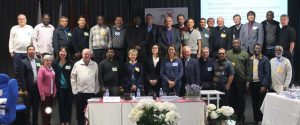 exaggerations, to the point of leading to the loss of the pastoral identity of our programmes. The tastes and the needs of the people who come to us can unwittingly lead us to that phenomenon condemned by St. Paul when he warned Timothy of the temptation of ‘titillating’ the ears of our listeners and hinder us from offering true teaching.
exaggerations, to the point of leading to the loss of the pastoral identity of our programmes. The tastes and the needs of the people who come to us can unwittingly lead us to that phenomenon condemned by St. Paul when he warned Timothy of the temptation of ‘titillating’ the ears of our listeners and hinder us from offering true teaching.
Your appeal, therefore, remains valid and helps us to ensure that this new expression of Camillian ministry, which is contemplated and encouraged by the new Constitution of the Order, will be developed in line with the authentic spirit of the charism of the Order.
- In your letter the appeal to holiness in life could not be absent. The two hundred and fiftieth anniversary of your canonisation makes this appeal more intense and more to the point. To begin with you invite your religious to walk with ‘rectitude and faithfulness’ so as not to bury ‘the very valuable talent that our Lord has placed in our hands so that we may achieve holiness during our lives and then in eternal life’. Later, your thinking is expressed more broadly: ‘I exhort everyone, both present and those of the future, to journey by the pathway of the spirit, that is to say of true religious mortification, if we want to be certain of our eternal salvation. Indeed, our Order requires perfect men who do the will of God and reach perfection and holiness. It is these who not only do good to themselves but also build up the Holy Church and the whole world. In it, great progress and profit will be achieved by them. In contrary fashion, those who are sensual, of little religious spirit, not mortified, will ruin the Order’.
 What makes your words true is the fact that you lived them, achieving high summits of perfection in charity. Many of our religious have followed you on the road of holiness, even though officially only one has been raised to the glory of the altars: the Blessed Enrico Rebuschini. In our time, innumerable and pressing invitations have reached us to deepen our spiritual lives, to make Christ the centre of our existences, the Absolute. Too many stimuli lead us to ‘decentre ourselves’. The secret of your holiness is captured in a phrase from the Rules of Life which you drew up in the year 1591: live only for the crucified Christ. This programme should also become operational for each one of us, finding support in concrete ascetic initiatives.
What makes your words true is the fact that you lived them, achieving high summits of perfection in charity. Many of our religious have followed you on the road of holiness, even though officially only one has been raised to the glory of the altars: the Blessed Enrico Rebuschini. In our time, innumerable and pressing invitations have reached us to deepen our spiritual lives, to make Christ the centre of our existences, the Absolute. Too many stimuli lead us to ‘decentre ourselves’. The secret of your holiness is captured in a phrase from the Rules of Life which you drew up in the year 1591: live only for the crucified Christ. This programme should also become operational for each one of us, finding support in concrete ascetic initiatives.
- At the end of your testamentary letter you send a ‘thousand blessings not only to those who are present but also those of the future who until the end of the world will be members of this Holy Order’.
Thanking you for this gesture of blessing which reaches us in the depths of our hearts, I ask you to extend it in a special way to the whole of the wider Camillian Family: the Congregations and the secular Institutes which have arisen over these centuries drawing inspiration from your charism, and the groups of lay people who, wishing to live their Christian lives in the light of merciful charity towards the poor, have asked to be united to us to perform the shared mission that you entrusted to us’.
Dearest religious brothers, while I entrust these pages to your thoughts, I take this opportunity to wish each one of you a serene period of holidays.
With fraternal affection.



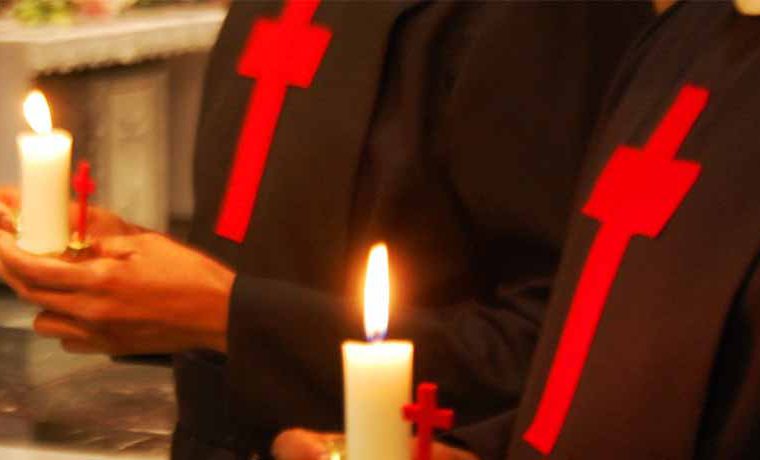
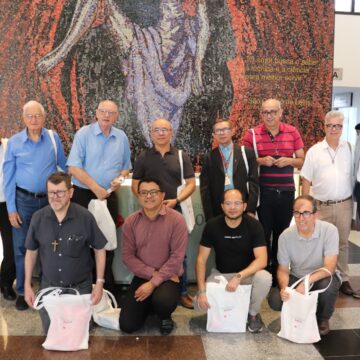
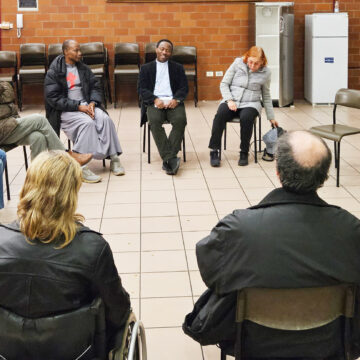
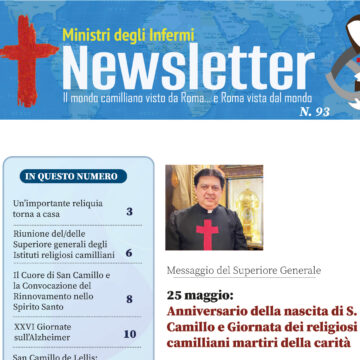
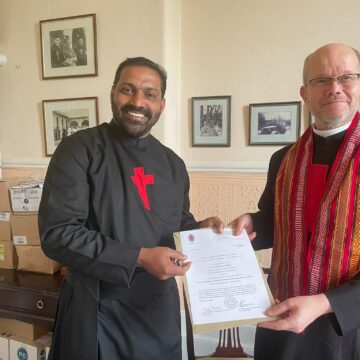
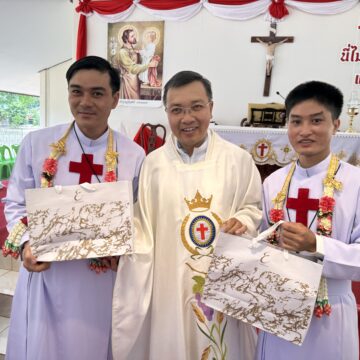
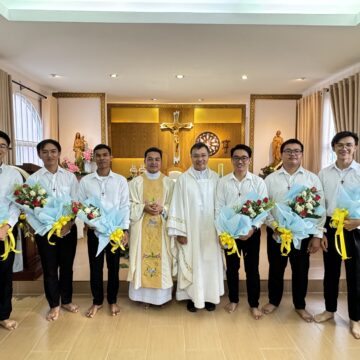
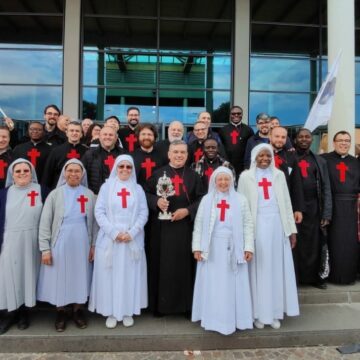
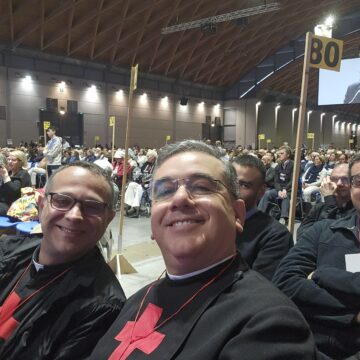
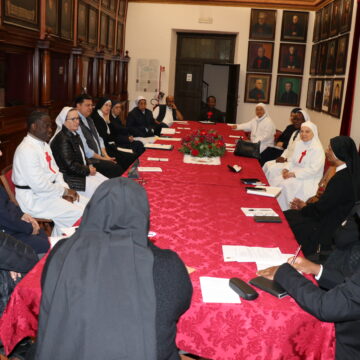
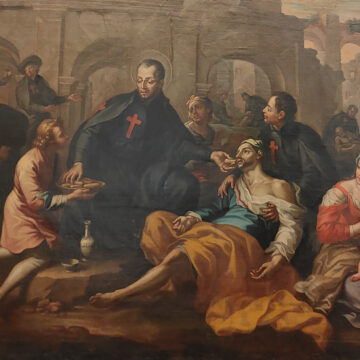


Camillians on Facebook
Camillians on Twitter
Camillians on Instagram